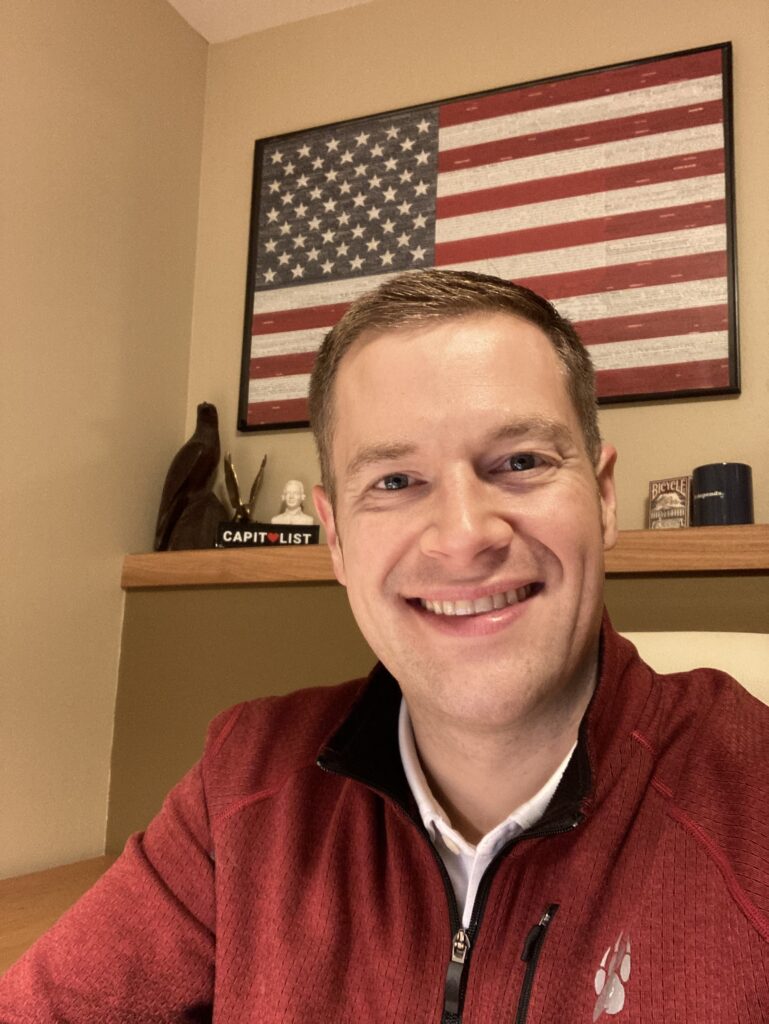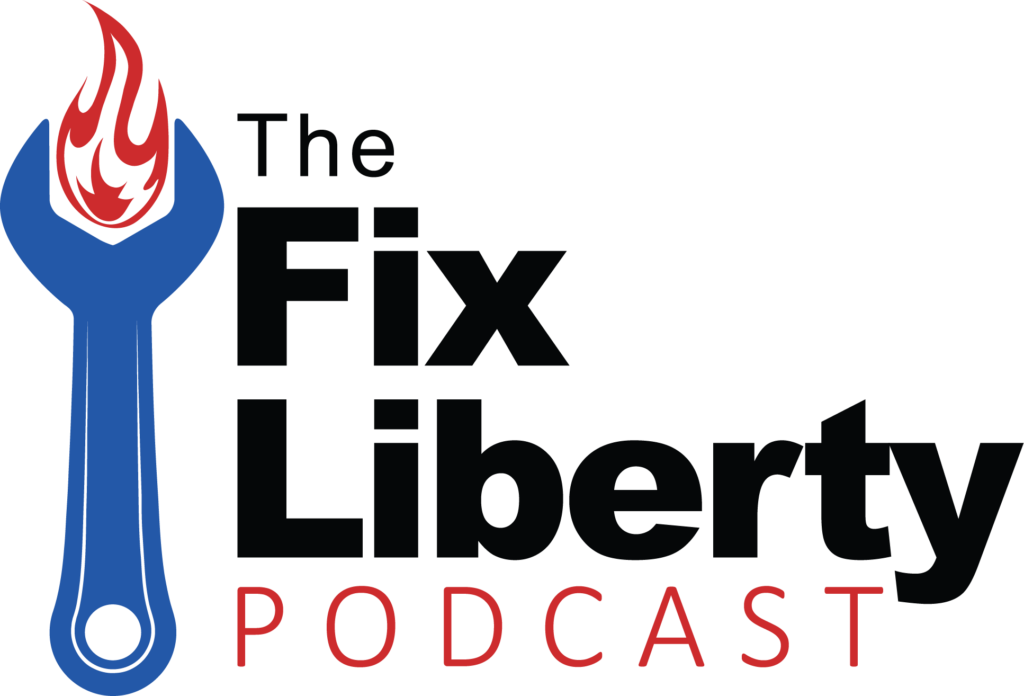I'm working to write my book. This page will be mostly dormant for a good long while. I'll be back by March 5, 2029. Then we will #FixLiberty.
... See MoreSee Less
As I announced earlier this week, I finished the first rough outline of my future book on December 5, 2024 (exactly 5.75 years after initiating this book writing project). My goal was to have this first outline done by the end of 2024. I am happy to report that I finished over three weeks early.
I printed off a hardcopy of the outline this weekend: the outline distills my 900+ pages of research notes down to 428 pages of increasingly organized thoughts. Check out the 😎 celebratory photos!
What happens next is a lot more work -- throughout 2025, I will be using my first outline to draft a second, sharper outline -- and I expect to start book writing no sooner than 2026. But I think the process of creating this first rough outline will prove to be the hardest aspect of my book-writing venture: I am thrilled to have completed it, and I am confident for what is ahead.
My overall goal is to be 📖 published by March 5, 2029 (10 years after initiating this book writing project). I think I am on track.
One thing will change in the interim period, however. I will be posting far fewer posts to Facebook, and (after tomorrow) I will be pausing my weekly email newsletter indefinitely. I may publish unique content periodically, but this account will likely be largely dormant in the public space for a few years. I need to turn inward to give this book-writing venture all the time and attention I have available for 🔥🔧 The Fix Liberty Project.
Please know that I remain hard at work behind the scenes, and I am always happy to talk about my work. So, by all means, feel free to ask me about my progress periodically. Don't be shy, I always appreciate hearing your interest.
My commitment to this venture is total, patient, and unwavering. 🙏 Lord willing, when I come back to this public space, it will be in full force -- book in hand, ready to engage American culture -- ready to #FixLiberty.
See you later! 🙂
✝️ "You [Lord] keep him in perfect peace whose mind is stayed on you, because he trusts you." -Isaiah 26:2 (ESV)
... See MoreSee Less
This morning, exactly 5 years and 9 months (to the day) after initiating this book writing project, I have finished my first pass through my research notes to craft the first rough outline of my future book.
I started this aspect of my work on November 11, 2023. My goal was to finish this aspect of my work by the end of 2024. In the end, I finished over three weeks ahead of schedule.
What comes next is more refinement. 2025 will be dedicated to more detailed outlining. I expect to start writing by 2026. My goal is to be published by March 5, 2029 (10 years after initiating this book writing project).
Thank you for journeying with me.
-Ross
#FixLiberty
... See MoreSee Less
📖 "At the beginning of our story, American life was truly Hobbesian -- 'solitary, poor, nasty, brutish, and short.' Americans probably enjoyed the highest standard of living in the world -- higher on average than their former colonial masters back in Britain -- yet by any modern measure they lived miserable lives… People lived one disaster away from destitution: a poor harvest could ruin an ordinary family and a shipwreck could turn a merchant prince into a pauper. Leisure was a luxury: candles and tallow lamps were so expensive that you had little choice after the sun went down but to go to bed and wait for the dawn… Travel was slow and dangerous. The best the average American -- isolated and careworn -- could hope for was, in Abraham Lincoln's phrase, 'a clean bed without any snakes in it.' These dismal figures were even more dismal for marginal groups such as women and blacks… The average woman gave birth to seven or eight children during her reproductive years, half of whom died in their first year… The vast majority of American blacks were enslaved… Different forms of oppression compounded each other. Black women and children worked in the fields along with the men. In 1860, the infant mortality rate for slaves is estimated to have been as high as 350 infant deaths per 1,000 births, compared with 197 for the population as a whole. Today life has improved immeasurably in every one of these dimensions. Solitary? Most Americans live in cities and even those who live in the countryside are wired into urban civilization by everything from the internet to indoor plumbing. Poor? Americans have the highest standard of living of any large nation in the world. Nasty? Most of the indignities that have dogged humankind since the birth of civilization have been either removed or tamed. There are drugs to dull the pain of childbirth or tooth extraction; indoor plumbing to civilize bodily functions; air-conditioning to protect people from the sweltering heat. You can summon light at the flick of a switch, send messages at the click of a mouse, even get a robot to vacuum your floor… Short? American life expectancy is more than twice what it was at the birth of the republic." -𝘊𝘢𝘱𝘪𝘵𝘢𝘭𝘪𝘴𝘮 𝘪𝘯 𝘈𝘮𝘦𝘳𝘪𝘤𝘢 by Alan Greenspan and Adrian Wooldridge (p. 418-419)
#FixLiberty
... See MoreSee Less
📖 "[R]ent seeking, even when it is legal, is not something that the parties involved want to advertise: neither the firms at the contributing end [of lobbying], nor the regulators and politicians at the receiving end. We should therefore expect the outcomes to be hidden." -𝘛𝘩𝘦 𝘎𝘳𝘦𝘢𝘵 𝘙𝘦𝘷𝘦𝘳𝘴𝘢𝘭: 𝘏𝘰𝘸 𝘈𝘮𝘦𝘳𝘪𝘤𝘢 𝘎𝘢𝘷𝘦 𝘜𝘱 𝘰𝘯 𝘍𝘳𝘦𝘦 𝘔𝘢𝘳𝘬𝘦𝘵𝘴 by Thomas Philippon (p. 157)
#FixLiberty
... See MoreSee Less
📖 "It is so much in the nature of law to support justice, that in the minds of the masses they are one and the same…[M]any falsely derive all justice from law… Slavery, protection, and monopoly find defenders, not only in those who profit by them, but in those who suffer by them. If you suggest a doubt as to the morality of these institutions, it is said directly -- 'You are a dangerous innovator, a utopian, a theorist, a despiser of the laws; you would shake the basis upon which society rests.'" -𝘛𝘩𝘦 𝘓𝘢𝘸 by Frédéric Bastiat (Section "The Results of Legal Plunder")
#FixLiberty
... See MoreSee Less
📖 "Upon some occasions, indeed, those [mutinous and turbulent] passions are restrained, not so much by a sense of their impropriety, as by prudential considerations of the bad consequences which might follow from their indulgence." -𝘛𝘩𝘦 𝘛𝘩𝘦𝘰𝘳𝘺 𝘰𝘧 𝘔𝘰𝘳𝘢𝘭 𝘚𝘦𝘯𝘵𝘪𝘮𝘦𝘯𝘵𝘴 by Adam Smith (Conclusion of the Sixth Part)
#FixLiberty
... See MoreSee Less
📖 “One reason for the ever-growing chasm [between Americans of differing ideologies] is that almost all of us are convinced that our position is 100 percent right, and the other side is 100 percent wrong — no matter how silly it seems, when you think about it, to assume that there are only two sides to all big debates.”-𝘛𝘩𝘦𝘮: 𝘞𝘩𝘺 𝘞𝘦 𝘏𝘢𝘵𝘦 𝘌𝘢𝘤𝘩 𝘖𝘵𝘩𝘦𝘳--𝘢𝘯𝘥 𝘏𝘰𝘸 𝘵𝘰 𝘏𝘦𝘢𝘭 by Ben Sasse (p. 81)
#FixLiberty
... See MoreSee Less
📖 "Our attitude plays an enormous role in our health." -𝘛𝘩𝘦 𝘓𝘢𝘸𝘴 𝘰𝘧 𝘏𝘶𝘮𝘢𝘯 𝘕𝘢𝘵𝘶𝘳𝘦 by Robert Greene (p. 228)
#FixLiberty
... See MoreSee Less
✝️ “For God so loved the world, that he gave his only Son, that whoever believes in him should not perish but have eternal life. For God did not send his Son into the world to condemn the world, but in order that the world might be saved through him. Whoever believes in him is not condemned, but whoever does not believe is condemned already, because he has not believed in the name of the only Son of God. And this is the judgment: the light has come into the world, and people loved the darkness rather than the light because their works were evil. For everyone who does wicked things hates the light and does not come to the light, lest his works should be exposed. But whoever does what is true comes to the light, so that it may be clearly seen that his works have been carried out in God.” -John 3:16-21 (ESV)
#FixLiberty
... See MoreSee Less


![As I announced earlier this week, I finished the first rough outline of my future book on December 5, 2024 (exactly 5.75 years after initiating this book writing project). My goal was to have this first outline done by the end of 2024. I am happy to report that I finished over three weeks early.
I printed off a hardcopy of the outline this weekend: the outline distills my 900+ pages of research notes down to 428 pages of increasingly organized thoughts. Check out the 😎 celebratory photos!
What happens next is a lot more work -- throughout 2025, I will be using my first outline to draft a second, sharper outline -- and I expect to start book writing no sooner than 2026. But I think the process of creating this first rough outline will prove to be the hardest aspect of my book-writing venture: I am thrilled to have completed it, and I am confident for what is ahead.
My overall goal is to be 📖 published by March 5, 2029 (10 years after initiating this book writing project). I think I am on track.
One thing will change in the interim period, however. I will be posting far fewer posts to Facebook, and (after tomorrow) I will be pausing my weekly email newsletter indefinitely. I may publish unique content periodically, but this account will likely be largely dormant in the public space for a few years. I need to turn inward to give this book-writing venture all the time and attention I have available for 🔥🔧 The Fix Liberty Project.
Please know that I remain hard at work behind the scenes, and I am always happy to talk about my work. So, by all means, feel free to ask me about my progress periodically. Dont be shy, I always appreciate hearing your interest.
My commitment to this venture is total, patient, and unwavering. 🙏 Lord willing, when I come back to this public space, it will be in full force -- book in hand, ready to engage American culture -- ready to #FixLiberty.
See you later! 🙂
✝️ You [Lord] keep him in perfect peace whose mind is stayed on you, because he trusts you. -Isaiah 26:2 (ESV)](https://scontent-lax3-1.xx.fbcdn.net/v/t39.30808-6/493272448_1231335128997438_9002049198672359721_n.jpg?stp=dst-jpg_p720x720_tt6&_nc_cat=110&ccb=1-7&_nc_sid=127cfc&_nc_ohc=RIB6OaIsylQQ7kNvwE5g36a&_nc_oc=AdncOOEAAiPJd61DKKWiiX64CQVWCdKre-WNG9BPBbSk7snRe5Z0a3911Kkv7FU3U2o&_nc_zt=23&_nc_ht=scontent-lax3-1.xx&edm=AKIiGfEEAAAA&_nc_gid=Gb6oT_ul1Amr8rkh8M_Qjg&oh=00_AfGI1nwudQr-3ID71Ucy1J5BobXM6UxmF_ZwWs200TxBJQ&oe=68102106)

